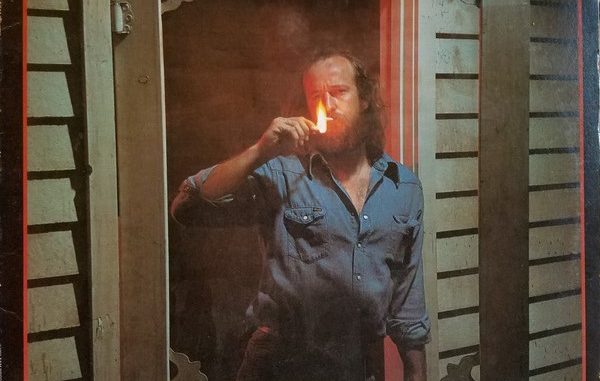
Side man to musical legends, a successful songwriter with a classic album to re-release.
Gordon Payne’s time as a musician was spent largely as a sideman. He recorded one solo album, 1978’s ‘Gordon Payne’ which was featured in Americana UK’s Lost Album series, which showed he had the instrumental, singing, and songwriting skills to develop a solo career. That he didn’t, was due to his commitment to his family, rather than the vagaries of the notoriously fickle music business. However, while Gordon Payne was a sideman, he was a sideman to such legends as J J Cale and Waylon Jennings, and he was the guitarist and singer with The Crickets in the ‘80s and early ‘90s before largely retiring from music in 1994. Americana UK’s Martin Johnson caught up with Gordon Payne over Zoom just after he had done the weekly grocery shop to talk about his career and solo album. It was fascinating to hear from a musician who had experienced Tulsa in its musical heyday in the ‘70s, and the moment the outlaw movement hit commercial pay dirt. The Americana UK Lost Album feature has sparked Gordon Payne’s interest in getting his solo album re-released, so it could be that new listeners will be able to catch that mix of the Tulsa, Nashville, and Memphis sounds that so perfectly captured its time. One final thought, though the interview took place before the sad passing of Cricket drummer and songwriter Jerry Allison, Gordon Payne’s reminisces add to his memory.
How are you?
Fine, this is my second Zoom meeting and I must admit I was a bit frightened for a while, haha. I really enjoyed your article on my solo album ‘Gordon Payne’.
I don’t often get the chance to ask this, but were there any mistakes in the article?
Nothing, you did it right, I didn’t find anything wrong with it. I thought it was very complimentary and I was pleased and honoured someone had taken the time to look back at my career.
What are you doing with your time these days, are you retired?
Well, I retired from music in ’94, and I’d been out with The Crickets, and my oldest son was a really good basketball player in high school, and in his sophomore year, and I’d missed half of his games. So I told J.I. and J.B. that I wasn’t missing any more games, and I’m going to retire. I left Waylon to get off the road, and somebody dangled the cash in front of me and I went back out with Johnny Rodriguez, and then Jerry Allision, J.I., called and said we only do five dates a year so why not become a Cricket? I was like for five dates a year, I will, haha. Next thing I know Paul McCartney comes to a concert and we did a record with him, ‘T Shirt’, and a year later we are doing 250 days a year, haha. People were always asking me how to break into the music business, but hell, I was doing my best to figure out how to break out.
I got into business after that, and did it for a long time, I’d moved to Texas, and my brother and I started an oil services company, we were a manufacturing company and built tanks for the drilling companies. We did that for ten-plus years, and then we finally sold out and I retired for three years and then a friend of mine wanted me to come back and help him with this scaffolding company, so now I run his sales department, and I’m enjoying it. My wife says it is the first real job I’ve ever had, haha. Not getting a real job until you are 68 isn’t bad at all, haha. I still do a little bit of music, a little writing, and a little recording, but other than that not much. Joe B. Maudlin passed away a few years ago, I still go back and see J.I., and I also go and see what is left of the Waylors, Richie Albright and Ralph Mooney are gone, but there are still a few of us left. We get together about once a year, but other than that I’m pretty well retired from music anyway.
You started out in music a long time ago, what was Tulsa like when you started?
Yeah, and I’ve been pretty lucky. Man, back then Tulsa was a hotbed, and it was a well-kept secret. There were probably thirty or forty bands playing nightclubs four or five nights a week, and it was nothing to go out and see Tommy Tripplehorn, who was with Gary Lewis & The Playboys, Jim Keltner, and those kinds of guys. They were great bands and so many places in Tulsa that artists would come through town, and after their show, they would want to go out and see the local bands. They would sometimes end up hiring them to back them on the road, and at one time, in every band we met on the road, you would see Tulsa guys, well most of them anyway. Tulsa was such a great music school for players, for young players especially.
You went through that school, why was it so effective at creating great players?
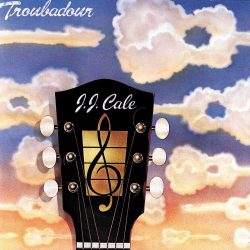 Number one, the drummers were really good, they had great time and I think it all started with Bob Wills and The Texas Playboys back in the ‘40s and ‘50s. Bob Wills and The Texas Playboys were based in Tulsa, and they played Cain’s Ballroom. So all those guys lived in Tulsa, and they were just so cordial they would spend time helping you learn this, you would maybe say how do you play that and they would just show you, haha. They would spend fifteen or twenty minutes with you, giving you pointers. Then all the guys in Leon’s band were there, and J J Cale taught me more than anybody. The first time I made any money was with Cale, haha, it was on a Monday night at a place that Don White played, Toby’s Club in Tulsa. It was on a Monday night that I first got paid, I made $6, haha, but I was glad to get it because I had been back in Tulsa after the army for about a year, and I had been trying to get on with Don White full time, because Don had a really good country rock band, and while we were buddies I just wasn’t good enough, I didn’t have the chops that you needed to play in those bands, they were all so good.
Number one, the drummers were really good, they had great time and I think it all started with Bob Wills and The Texas Playboys back in the ‘40s and ‘50s. Bob Wills and The Texas Playboys were based in Tulsa, and they played Cain’s Ballroom. So all those guys lived in Tulsa, and they were just so cordial they would spend time helping you learn this, you would maybe say how do you play that and they would just show you, haha. They would spend fifteen or twenty minutes with you, giving you pointers. Then all the guys in Leon’s band were there, and J J Cale taught me more than anybody. The first time I made any money was with Cale, haha, it was on a Monday night at a place that Don White played, Toby’s Club in Tulsa. It was on a Monday night that I first got paid, I made $6, haha, but I was glad to get it because I had been back in Tulsa after the army for about a year, and I had been trying to get on with Don White full time, because Don had a really good country rock band, and while we were buddies I just wasn’t good enough, I didn’t have the chops that you needed to play in those bands, they were all so good.
Cale hired me for Monday nights, and that was the best practice I could get. So that and the fact I learned how to play harmonica, I spent about six months learning how to play harmonica. I saw the Nitty Gritty Dirt Band live, and Jimmy Ibbotson played harmonica and I thought, man, I could do that and so I went and got me some harmonicas and I practiced ten or twelve hours a day. My old roommate would holler from the next room for me to play something else, haha, get a new song or something. I eventually went out one night and played ‘I’m So Lonesome I Could Cry’ and Don White let me sit in, he hired me that night, but I had had a year in that school mainly with Cale, and so that is what really got me in, that was really a big break for me getting with Don White.
Don White is a name you hear mentioned with awe by other musicians, but he never really broke out of Tulsa and Oklahoma, did he?
He moved to Nashville for five or six years, and we had a little band, Richie Albright had left Waylon also, so Richie and I started a band called Okie and Don White joined us. The bass player wasn’t an Okie but three out of the four of us were so we went with it. We played around locally and had a real good time, and Richie Albright was asked to produce a Johnny Rodriguez record and he wanted to cut a couple of my songs and so he asked me to play rhythm on it and sing harmony with Johnny. So I did and the next thing I knew Johnny has got us out on the road, haha. We spent three years on the road with Johnny, Don White, Richie, and another guy named Jody Maphis was out there with us and we had Larry Gadler on bass. It was mainly Tulsa people.
You mentioned your songwriting there, you’ve written a few songs over the years haven’t you, did you manage to get a reasonable publishing deal?
Yes, I’ve been fortunate. It is all sorted, but I don’t make any money out of it, haha. What has been interesting has been the internet, and the internet has revived royalties. I’ve been shocked at how well BMI, ASCAP, and the publishing companies have mined, like you would a gold mine, the internet. The cheques have just been really nice in the last three or four years. I did all my recording on LPs, and then cassettes came out and the royalties went back up and then died off, when CDs came out royalties went back up and then died off, and this time it’s the internet and the internet has been better than cassettes or CDs. It has been very nice.
How did you get to join the Waylors?
I was a huge fan, I knew all his songs and I sat around playing his songs. He called on a Tuesday and asked me if I could be in Vegas on the Saturday night because he understood I could play harmonica and guitar, and he wanted to see if we would click and he asked me to sit in at the Golden Nugget. I was like of course I will do it, and so for the next three days I boned up on all his old records and I went to Vegas. Now Waylon didn’t do a set list, he didn’t tell you what he was going to play, and that fit me perfectly because that was Cale and it was Don White, they never did a set list, you just had to figure it out and come in at a good place, haha. It fit me to a T, and it was nothing for me to figure out what song he was on, he threw me a couple of times but most of them I knew. After the first set, we did two sets, he told me I was hired and this what we are going to do and this what I’ll pay you. That training in Tulsa worked out perfectly, and the fact I was real familiar with his material already.
Did you guys ever get a sense of how groundbreaking things were becoming with Waylon?
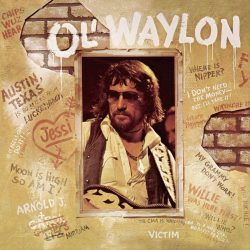 We knew. I’ll tell you why. When I started out in 1975 there was one bus, and twelve of us were on one bus, the next year he put out ‘Are You Ready For The Country?’ and he had a pretty good hit on it, and then ‘Ol Waylon’ came out. There is an interesting story, we recorded with Waylon and I played a little bit on ‘Are You Ready For The Country?’ but a lot on those records after that, and we cut ‘Luckenbach, Texas’ on a Tuesday and did the overdubbing on Wednesday and Thursday, and on Friday we hit the road and on Saturday night we played Hollywood, Florida, and about thirty or forty minutes into the set Waylon asked the audience if they wanted to hear a new song, and never told us he just threw it out there. So we played ‘Luckenbach, Texas’ and by the second verse, the crowd was singing along to the chorus. We just looked around at each other and to this day it still gives me goosebumps.
We knew. I’ll tell you why. When I started out in 1975 there was one bus, and twelve of us were on one bus, the next year he put out ‘Are You Ready For The Country?’ and he had a pretty good hit on it, and then ‘Ol Waylon’ came out. There is an interesting story, we recorded with Waylon and I played a little bit on ‘Are You Ready For The Country?’ but a lot on those records after that, and we cut ‘Luckenbach, Texas’ on a Tuesday and did the overdubbing on Wednesday and Thursday, and on Friday we hit the road and on Saturday night we played Hollywood, Florida, and about thirty or forty minutes into the set Waylon asked the audience if they wanted to hear a new song, and never told us he just threw it out there. So we played ‘Luckenbach, Texas’ and by the second verse, the crowd was singing along to the chorus. We just looked around at each other and to this day it still gives me goosebumps.
How fast and how big that record went up, it was huge, and right after that we had three buses, and during that year ‘Waylon & Willie’ was put out and that also skyrocketed. Willie had put out ‘Stardust’ about the same time, and in my second year ‘Wanted! The Outlaws’ was put out with Waylon, Jessie, Tompall Glaser, and Willie, and we did a big Willie and Waylon tour. We didn’t have good sound or lights because it was their first foray into it, but we played in really big venues. When ‘Ol Waylon’ came out it changed country music forever, because we began to take our own stage crew, and our own sound, and our own lights. We had the same setup every day and we had our own set with the big W behind it. Nobody had ever done that before in country music and it was changed forever. We knew it was huge, we knew what was going on.
You then went with the Crickets. Some people think the Crickets were just Buddy Holly, but they had their own career in the first half of the sixties and were there when the LA recording industry was just starting up in 1960, they rode the first Rock’n’Roll revival and kept going into the 21st Century.
What was fun for me was after watching what Waylon went through and with Rodrigeuz, I didn’t want to record another solo album because I didn’t want the headaches they had, and I didn’t want to spend as much time as they did on their music. I don’t know how to say this nicely, but their relationships with their families, to me, wasn’t what I wanted. So I kind of backed off the artist thing and it was a conscious decision. I still did a bit of recording but not a lot. I wrote a lot of songs, I wrote for multi-media, and for Famous Music for a while. The Crickets were just perfect for me because we could do whatever we wanted, we would come to England and we could play at being big stars, haha. We would go home and, hell, we couldn’t get arrested in the South of the US, though we did a lot up in the mid-West, Minnesota, Iowa, the Dakotas, Wisconsin, we played a lot up in there and we did real well. New York was also good to us, and Ohio was pretty good to us. But when we came to England we always had fun, haha.
It’s surprising the Crickets didn’t do anything in South being Texas boys, and you from Oklahoma.
We played a lot in Texas, we did OK there, but it was nothing like the allure of Great Britain. We would pack The Palladium, and Hammersmith Odeon, and that was really fun for me.
The Crickets also recorded some of your songs, didn’t they?
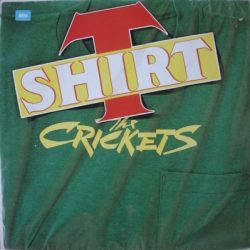 We did, J.I. and I wrote some songs, and we put those out. We started recording an album for Rollercoaster about the time that McCartney bought the publishing rights to Buddy Holly and The Crickets’ songs in the US, and so every year on Buddy’s birthday they would have a big celebration. One year he had a contest and said next year we are going to get a major artist to record the best soundalike song written this year. ‘T Shirt’ won the contest and we went to McCartney’s studio to record it, and about that time J.I. went down to CBS, and we had some good friends at CBS Records, and my wife was one of the promotion co-ordinators, and two of our best friends were in A&R, and when we told them we were doing a McCartney record they said we want to put it out. We took the Rollercoaster stuff and remixed it and put it out on CBS, that was the album ‘T Shirt’. That was a fun time for me, I tell you, haha. The hardest part for me was being away from my kids because they were little, and you can see them on the ‘T Shirt’ video, and my eldest son was ten, the youngest son was four or five, so that was hard for me, being on the road.
We did, J.I. and I wrote some songs, and we put those out. We started recording an album for Rollercoaster about the time that McCartney bought the publishing rights to Buddy Holly and The Crickets’ songs in the US, and so every year on Buddy’s birthday they would have a big celebration. One year he had a contest and said next year we are going to get a major artist to record the best soundalike song written this year. ‘T Shirt’ won the contest and we went to McCartney’s studio to record it, and about that time J.I. went down to CBS, and we had some good friends at CBS Records, and my wife was one of the promotion co-ordinators, and two of our best friends were in A&R, and when we told them we were doing a McCartney record they said we want to put it out. We took the Rollercoaster stuff and remixed it and put it out on CBS, that was the album ‘T Shirt’. That was a fun time for me, I tell you, haha. The hardest part for me was being away from my kids because they were little, and you can see them on the ‘T Shirt’ video, and my eldest son was ten, the youngest son was four or five, so that was hard for me, being on the road.
You’ve explained why you only recorded one solo album, but do you have any tinge of regret you never recorded another solo album?
No, I really don’t. The only thing I regret after retiring from music is my pals, the Waylors and The Crickets, not being around them on a regular basis. You go through those things, the ups and the downs, and you become closer than brothers. So I miss the guys, but I don’t have any regrets about it.
Your only solo album is absolutely superb, was it as easy to record as it sounds?
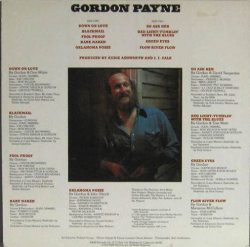 It wasn’t hard at all, haha. I’ll tell you what, Audie Ashworth had a recording studio in his basement, and we would get together and I would play him songs and say let’s do a recording session, and we would do a basic track recording session with Cale, and Audie or Cale would come and put his two cents in later. When we finished a recording session we would get together and pick the tracks that were the best, and then they would give me free rein in the studio and I took as long as I wanted. I’ve read the article on your site and you had the YouTube link to ‘Bare Naked’ and I listened to it and I remembered how many times I played those solos, haha. I spent maybe two or three days just getting the best solo, but I had plenty of time. That was key on that album, Audie didn’t care he was like, get it how you like it and then just holler at him and he would tell me whether it was good enough to stop, haha. We always used to say a good producer is only there to tell you when you’ve played it enough. After we cut the basic tracks it was a guy called Jimmy Tarbutton and I who spent hours and hours together in the studio. It was very beneficial for me, and it also taught me to say that is what we need, I got to where I could say that is good, let’s print it, and play it around for people. It was good, it was easy, and it was fun, haha.
It wasn’t hard at all, haha. I’ll tell you what, Audie Ashworth had a recording studio in his basement, and we would get together and I would play him songs and say let’s do a recording session, and we would do a basic track recording session with Cale, and Audie or Cale would come and put his two cents in later. When we finished a recording session we would get together and pick the tracks that were the best, and then they would give me free rein in the studio and I took as long as I wanted. I’ve read the article on your site and you had the YouTube link to ‘Bare Naked’ and I listened to it and I remembered how many times I played those solos, haha. I spent maybe two or three days just getting the best solo, but I had plenty of time. That was key on that album, Audie didn’t care he was like, get it how you like it and then just holler at him and he would tell me whether it was good enough to stop, haha. We always used to say a good producer is only there to tell you when you’ve played it enough. After we cut the basic tracks it was a guy called Jimmy Tarbutton and I who spent hours and hours together in the studio. It was very beneficial for me, and it also taught me to say that is what we need, I got to where I could say that is good, let’s print it, and play it around for people. It was good, it was easy, and it was fun, haha.
I was playing lead guitar solos, I didn’t get to do that for Waylon. I did play lead for Jessie, and that was a blast, but not for Waylon. I had this song called ‘Red Light’ and I was a big Tom Waits fan and his ‘Fumblin With The Blues’ and I was playing around in the living room and it had two of the exact same chords I’d used on ‘Red Light’, and so I figured out a little medley and we went in and recorded it. Then we hired Hollie Farris in on that song on trumpet, and that was either Audie or Cale’s idea to bring a trumpet in. Jimmy and I told Hollie to play whatever he wanted to play, we said we would give him plenty of time and he just had to tell us when to stop. The track was about eight or nine minutes long and we left it after about four minutes on the record, but we had so much fun doing the track we just kept doing it, haha. Hollie got on there and he played, and we put him on two or three tracks so we got to pick and choose when he played. He played for James Brown, and when he got through he came in and was like that was so much fun, James Brown doesn’t want you to play, he wants you to dance. He had a ball, and I loved what he played on that record.
It is a pity it isn’t available at the moment, isn’t it?
Well, John Beecher has all the tracks and he keeps saying he is going to put it out again, and so I’m going to send John your article and tell him you guys have a little interest going.
It is a great record in its own right but is also part of the musical history of those times because of all the people involved, Cale and Audie, the Memphis and Nashville guys, and the Waylors.
Thank you so much. When we were all through, A&M never asked me to do another album, and it was around the same time I was beginning to think I didn’t want to be a solo act so things worked out as they were supposed to, haha, but it was fun.
You’ve played with some legendary artists and played on some legendary records, and you’ve also managed to maintain your family life and had a second career away from music, so things have worked out well.
I’ve been with my wife for 36 years and we met at a Waylon concert, the same woman.
Are those your gold records I can see behind you?
Yes, they are for Waylon, Reba McEntire, one up there is for my wife, she has got probably more than I do, haha, she was Promotional Director for MCA when they were hot. The one I’m most proud of, and it is not a gold record, it’s for the Crickets’ induction into the Rock and Roll Hall of Fame, that is the best one up there.
Finally, do you want to say anything to our UK readers?
When I first became a Cricket it was obvious what huge fans the people of Great Britain are, they know the history and they are very appreciative. The best time I ever had was when we did ‘True Love Ways’ at a particular show and I’d been singing it for two or three years so my voice was starting to click with the songs, and the fans began to be really appreciative, and when we got through that song they wouldn’t quit clapping. I didn’t know what to do, I looked at J.I. and the only thing I could do was sing it again, haha. I loved my time in Great Britain, and I’ve still got a ton of great friends over there like John Firminger who edits The Cricket Files. That is the one thing I miss about touring is the people, I loved it. If anyone wants a copy of the album you can get it on eBay for $50, haha.
I got mine back in the day for 50p, haha.
I’m going to try and get it released, I’m going to put a fire under it.


